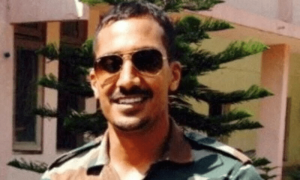Govt deal with protesters was 'firefighting', not a cure to the problem: Fawad Chaudhry

Information Minister Fawad Chaudhry said on Saturday the agreement reached between the government and violent protesters who demonstrated against the acquittal of Aasia Bibi was "firefighting" and not a permanent solution to the larger problem of extremism.
"We need to take steps against extremism, we need to take steps against such kind of violent protesters and we need to come up with a permanent solution," he told the BBC.
"Right now this is not a cure. This is firefighting, what we are doing," he said, adding that the Pakistan Tehreek-i-Insaf (PTI) government was committed to the cure, which is "the real thing".
Editorial: Another surrender
He defended the government's decision to negotiate with the protesters, who blocked roads and disrupted traffic throughout the country for three days.
"We had two options: either to use force, and when you use force people can be killed. That is not something a state should do... We tried negotiations and (in) negotiations you take something and you leave something."
Chaudhry said the decision on whether or not to bar Aasia Bibi from the leaving the country will be taken by a court.
The government will "take all steps necessary" to ensure Bibi's safety, the minister added.
The Tehreek-i-Labbaik Pakistan (TLP) and other religiopolitical parties had launched countrywide protests on Wednesday after the Supreme Court acquitted Bibi, who had been on death row for the past eight years on blasphemy charges.
Last night, the government and the TLP had signed a deal to conclude the latter's nationwide protest. One of the major concessions the government agreed to was to "initiate the legal process" to place Bibi's name on the exit control list (ECL).
The government had also assured the party that it would not oppose a review petition filed against the Supreme Court's judgement in the Aasia Bibi blasphemy case. The state further promised to take appropriate legal action to redress any deaths that may have occurred during the protests against the Aasia Bibi verdict and to release all people picked up in connection with the protests starting October 30.
The TLP, in turn, only offered an apology "if it hurt the sentiments or inconvenienced anyone without reason".













































